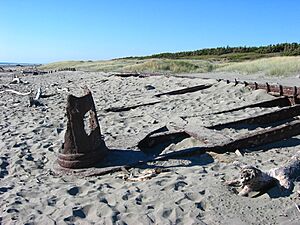Hydrabad (ship) facts for kids
Quick facts for kids History |
|
|---|---|
| Name | Hydrabad |
| Owner | |
| Builder | Robert Duncan & Company, Port Glasgow |
| Yard number | 10 |
| Launched | 14 May 1865 |
| Completed | August 1865 |
| Fate | Wrecked on 24 June 1878 |
| General characteristics | |
| Type | Iron cargo/passenger sailing ship |
| Tonnage | 1339 tons net |
| Length | 229 ft 6 in (70.0 m) |
| Beam | 37.2 ft (11.3 m) |
| Draught | 23.2 ft (7.1 m) |
| Sail plan | full-rigged ship |
The Hydrabad was a large sailing ship made of iron. She was built in Scotland and launched in 1865. This ship carried both goods and people across the seas. She had different owners during her time. Sadly, the Hydrabad was wrecked off the coast of New Zealand in 1878. People tried to save her, but they couldn't. Her remains are still on the shoreline today.
Building the Hydrabad
The Hydrabad was built by Robert Duncan & Company. This company was located in Port Glasgow, Scotland. The ship was launched on May 14, 1865. She was fully finished in August 1865.
Her first owner was the Bombay Iron Ship Company, from Bombay. Later, a company called Stephens and Sons, from London, bought her. The Hydrabad was a full-rigged ship. This means she had three tall masts with many square sails.
The ship was made entirely of strong iron. She was about 229 ft 6 in (70.0 m) long. Her width, called the beam, was 37.2 ft (11.3 m). The part of the ship under the water, called the draught, was 23.2 ft (7.1 m). The Hydrabad had two large storage areas for cargo. She also had a beautifully carved figurehead on her front. This figurehead looked like a Hindu warrior. The rooms for passengers were very fancy.
The Shipwreck
In 1878, the Hydrabad was sailing from Lyttelton, New Zealand. She was heading to Adelaide, Australia. The ship was carrying train parts. These parts had been sold to the government of South Australia.
On June 24, 1878, a very bad storm hit the ship. Captain Holmwood, the ship's captain, decided to run the ship onto the sand. He did this on Waitarere Beach. This beach is about five kilometers south of the Manawatu River mouth. Running the ship aground helped save everyone on board. No one lost their life in the shipwreck.
People tried twice to get the ship floating again. The first try was in November 1878. The second try was on January 7, 1879. During the second attempt, another ship, the SS Glenelg, pulled the Hydrabad off the beach. But then, the Hydrabad started to fill with water very quickly. So, they had to give up. The Hydrabad was left to drift back onto the beach. The plan was to unload her cargo and take it to Foxton.
Later, a fire broke out on the ship. This fire damaged her metal sides. After the fire, the wreck was completely abandoned. The ship had been insured for £15,000. Her cargo was insured for £24,500.
Over the years, storms have pushed the remains of the Hydrabad further up the beach. Today, the wreck is well above the high-water mark. Sometimes, the moving sand covers it up. Other times, the sand uncovers it. A group called the Maritime Archaeological Association of New Zealand studied the wreck. They looked at how fast it was decaying. They also thought about making a memorial using parts of the ship.


